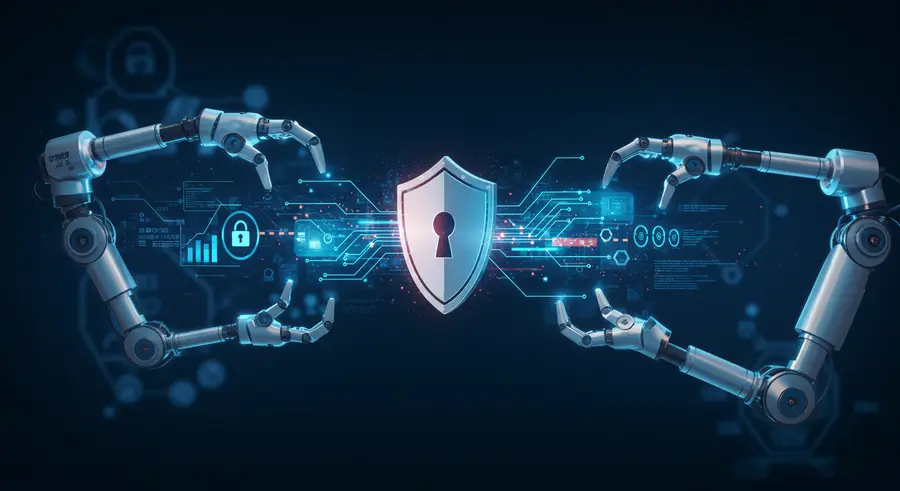The Dawn of Intelligent Security: AI in DevSecOps
The relentless pace of software development in a DevOps environment demands equally rapid and robust security measures. Traditional manual security processes often become bottlenecks, struggling to keep up with continuous integration and continuous delivery (CI/CD) pipelines. This is where Artificial Intelligence (AI) and Machine Learning (ML) step in, offering a transformative approach to embedding security seamlessly into every stage of the development lifecycle.

AI in DevSecOps isn't just about automation; it's about intelligent automation. It allows security teams to move beyond static rule-based detections to dynamic, predictive, and adaptive threat intelligence. By analyzing vast amounts of data, AI can identify patterns, anomalies, and potential vulnerabilities that might elude human eyes or conventional tools. This shift enables security to "shift left" more effectively, catching issues earlier when they are cheaper and easier to fix.
Key Applications of AI in DevSecOps
AI and ML are being applied across various crucial aspects of DevSecOps:
- Automated Vulnerability Management: AI can analyze codebases, binaries, and dependencies to identify known and unknown vulnerabilities with greater accuracy and speed than traditional static (SAST) and dynamic (DAST) analysis tools. Machine learning models can learn from past vulnerabilities and exploits to predict new attack vectors.
- Intelligent Threat Detection and Prediction: By continuously monitoring logs, network traffic, and system behavior, AI algorithms can detect subtle anomalies indicative of a security threat. They can predict potential attacks based on historical data and current threat intelligence, allowing for proactive defense strategies.
- Automated Incident Response: In the event of a security incident, AI can help automate parts of the response process, such as triaging alerts, isolating compromised systems, and recommending remediation steps. This significantly reduces response times and minimizes damage.
- Risk Prioritization: With a multitude of vulnerabilities and threats, prioritizing which ones to address first is critical. AI-powered systems can assess the actual risk posed by each vulnerability, considering factors like exploitability, potential impact, and asset criticality, providing security teams with actionable insights. For a deeper understanding of market trends impacting risk, an AI-powered market sentiment analysis tool can be invaluable.
- Security Policy Enforcement: AI can help ensure that security policies are consistently applied across the development pipeline, from code commits to deployment configurations. It can detect deviations from policies and automatically flag or remediate them.
For more insights on integrating AI into your operations, explore resources on Azure DevSecOps solutions. Additionally, understanding how data drives these AI systems can be explored through topics like IBM Data Science. To understand the broader impact of AI, consider articles on Wired's AI section.
Benefits and Challenges
The integration of AI into DevSecOps offers numerous benefits:
- Enhanced Efficiency: Automating repetitive security tasks frees up security professionals to focus on more complex strategic initiatives.
- Improved Accuracy: AI's ability to process and analyze vast datasets leads to more accurate detection of vulnerabilities and threats, reducing false positives and negatives.
- Faster Feedback Loops: Security insights are provided much earlier in the development cycle, allowing developers to fix issues quickly and efficiently.
- Proactive Security Posture: Moving from reactive incident response to proactive threat prediction and prevention.
- Scalability: AI systems can scale to handle the security demands of large and complex applications and infrastructures.
However, challenges exist. The quality of AI's output is highly dependent on the quality and volume of data it's trained on. Bias in training data can lead to biased security assessments. The complexity of AI models can also make it difficult to understand why a certain decision was made, leading to "black box" issues. Furthermore, integrating AI tools seamlessly into existing DevSecOps pipelines requires significant expertise and thoughtful planning.
The Future is Intelligent Security
As software systems grow more complex and cyber threats become more sophisticated, the role of AI in DevSecOps will only expand. We can expect more integrated platforms offering end-to-end intelligent security, autonomous remediation capabilities, and even AI-driven security orchestration. Embracing AI is not just about adopting new tools; it's about evolving the very philosophy of how we approach security in the modern development landscape. It's about building an intelligent shield around our software, capable of adapting to the ever-changing threat landscape.